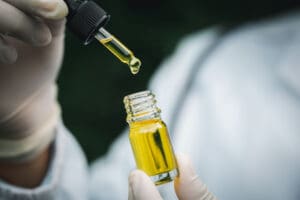Cannabinoid topicals are an exciting area of cannabis treatment that is gaining a lot of interest. Many patients find topicals to be less intimidating compared to inhaling or ingesting cannabis because of how easy creams and ointments are to use. However, the caveat is that there has been relatively minimal research in this area, so it’s unclear exactly what conditions cannabis creams are helpful to treat. That being said; there is in vitro (i.e test tube studies) and animal studies that suggest topical cannabinoids might be useful for the treatment of a few illnesses. Much of the information discussed below comes from an excellent systematic review titled “Mechanisms of Cannabinoids and Potential Applicability to Skin Diseases”
Let’s breakdown several areas of interest when it comes to topical cannabinoids:
Pain
Pain can be quite debilitating for patients and finding ways to effectively treat it can be life changing. There are two forms of pain, nociceptive and neuropathic that makeup almost all pain.
Nociceptive pain is the most common type of pain, for example the pain people experience when they stub their toe or have knee joints hurting from arthritis. Trauma or injury activates nociceptive receptors in the body to make your body experience pain.
Neuropathic pain is a bit more complex; it involves damage or insult to the nervous system. This can occur, for example, from a herniated disk in your spine. Neuropathic pain can feel like a sharp stabbing or tingling sensation. This type of pain can become chronic (long lasting) because damage to the nervous system can take a long time to heal.
Cannabinoids have shown promise to inhibit pain pathways to reduce nociceptive pain and may also help reduce the possibility for the pain to develop into chronic neuropathic pain. There have been patient reports that cannabis cream helped reduce pain after application for skin that had blistered. These patients were in turn able to decrease their opioid use which they were using for pain management at the time. Patient’s also reported a quick onset of action; patients have reported feeling relief of pain in 3 to 5 minutes after application. It was also found that their skin healed more quickly.
Cannabis creams are worth trying as an alternative or additional therapy in most patient populations for pain management.
Itch
Itch may be one of the most irritating symptoms of any skin condition. It can be caused by several conditions such as eczema, psoriasis, bug bites, allergic reactions etc. There is data suggesting that cannabinoids work through different mechanisms from antihistamines to reduce itch and inflammation from an allergic response.
Common treatments for itch are the use of antihistamines or corticosteroid creams. Using a cannabis cream alongside an antihistamine may be the most effective because they work differently to treat the itch.
Inflammation
Inflammation is the result of your bodies immune system reacting to injury. This process causes pain, redness, swelling, reduced mobility, and heat. Inflammation, initially, is beneficial because it brings important cells, blood, and nutrients to an injury site. However, prolonged periods of inflammation actually has a detrimental effect, which is why research has investigated cannabinoids to help minimize the inflammatory response.
Cannabidiol (CBD), an active component of cannabis, has shown to reduce inflammation and increase antioxidant activity. Cannabinoids also work to down-regulate signalling molecules that contribute to an allergic inflammatory response. They also slow the function of immune cells and recruitment to injured sites to reduce inflammation. Cannabis has shown to have several promising mechanisms to treat inflammation.
Topical cannabis is an alternative option to manage inflammation. It would be a good option for people who cannot take anti-inflammatory pain medication, such as Advil, due to side effects.
Cell Proliferation
Cell proliferation is the process of cells dividing too quickly. This can result in skin issues such as psoriasis. Several tests and animal studies suggest cannabinoids use multiple mechanisms of action to reduce excessive cell proliferation. This means that cannabis creams may be effective for psoriasis.
Interestingly, researchers also found that Tetrahydrocannabinol (THC) inhibited hair shaft elongation and affected cells that damage hair follicles. Further research is needed, but cannabinoids may play a role in hair loss prevention in the future.
Fibrosis/Scarring
Cannabinoids have very weak evidence in vitro and in animal studies to reduce fibrosis or scarring. Which means it is possible that cannabis creams can help treat scarring. More information is needed to confirm this but using a cannabis cream alongside proven anti-scarring therapy is an option for patients.
For a personalized treatment plan book an appointment with the Apothecare team today!


